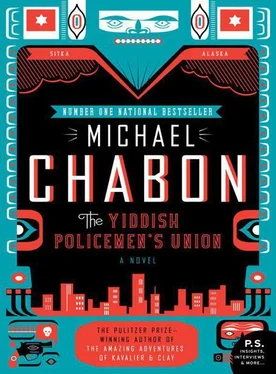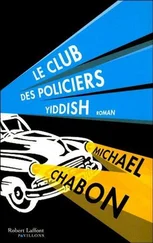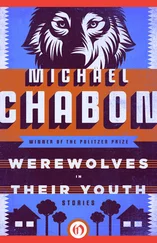Michael Chabon - The Yiddish Policemen's union
Здесь есть возможность читать онлайн «Michael Chabon - The Yiddish Policemen's union» — ознакомительный отрывок электронной книги совершенно бесплатно, а после прочтения отрывка купить полную версию. В некоторых случаях можно слушать аудио, скачать через торрент в формате fb2 и присутствует краткое содержание. Жанр: Альтернативная история, Полицейский детектив, на английском языке. Описание произведения, (предисловие) а так же отзывы посетителей доступны на портале библиотеки ЛибКат.
- Название:The Yiddish Policemen's union
- Автор:
- Жанр:
- Год:неизвестен
- ISBN:нет данных
- Рейтинг книги:5 / 5. Голосов: 1
-
Избранное:Добавить в избранное
- Отзывы:
-
Ваша оценка:
- 100
- 1
- 2
- 3
- 4
- 5
The Yiddish Policemen's union: краткое содержание, описание и аннотация
Предлагаем к чтению аннотацию, описание, краткое содержание или предисловие (зависит от того, что написал сам автор книги «The Yiddish Policemen's union»). Если вы не нашли необходимую информацию о книге — напишите в комментариях, мы постараемся отыскать её.
The Yiddish Policemen's union — читать онлайн ознакомительный отрывок
Ниже представлен текст книги, разбитый по страницам. Система сохранения места последней прочитанной страницы, позволяет с удобством читать онлайн бесплатно книгу «The Yiddish Policemen's union», без необходимости каждый раз заново искать на чём Вы остановились. Поставьте закладку, и сможете в любой момент перейти на страницу, на которой закончили чтение.
Интервал:
Закладка:
“Tell you what, Meyer. If you put down that beer,” Berko says, trying and failing not to sound like a policeman, “I’ll let you hold this nice baby. How about that? Look at him. Look at those thighs, come on. You have to squeeze them. Put down the beer, all right? And hold this nice baby for a minute.”
“He is a nice baby,” Landsman says. He removes another inch of beer from the bottle. Then he puts it down, and shuts up, and takes the baby, and smells him, and does the usual injury to his heart. Pinky smells like yogurt and laundry soap. A hint of his father’s bay rum. Landsman carries the baby to the doorway of the kitchen, and tries not to inhale, and watches as Ester-Malke peels a sheet of waffles from the iron. She is using an old Westinghouse with Bakelite handles in the shape of leaves. It can blast out four crisp waffles at a time.
“Buttermilk?” Berko says, studying the chessboard now, stroking a finger along his heavy upper lip.
“What else?” Ester-Malke says.
“Real, or milk with vinegar?”
“We did a double-blind test, Berko.” Ester-Malke hands Landsman a plate of waffles in exchange for her younger son, and even though he doesn’t feel like eating, Landsman is happy to make the trade. “You can’t tell the difference, remember?”
“Well, he can’t play chess, either,” Landsman says. “But look at him pretending.”
“Fuck you, Meyer,” Berko says. “Okay, now, seriously, which piece is the battleship?”
The family chess madness had burned out or redirected its energies by the time Berko came to live with Landsman and his mother. Isidor Landsman had been dead for six years, and Hertz Shemets had transferred his skills at feinting and attack to a much larger chessboard. That meant there was no one to teach Berko the game but Landsman, a duty that Landsman carefully neglected.
“Butter?” Ester-Malke says. She ladles fresh batter into the cells of the waffle iron while Pinky sits on her hip and offers his unsolicited advice.
“No butter.”
“Syrup?”
“No syrup.”
“You don’t really want a waffle, do you, Meyer?” Berko says. He abandons the pretense of studying the board and moves on to the volume by Siegbert Tarrasch as if he will be able to make heads or tails of that.
“Not in all honesty,” Landsman says. “But I know that I should.”
Ester-Malke eases the lid of the iron down onto the grids of batter. “I’m pregnant,” she says in a mild tone.
“What?” Berko says, looking up from the book of orderly surprises. “Fuck!” This word is spoken in American, Berko’s preferred language for swearing and harsh talk. He starts working over the stick of imaginary chewing gum that seems to appear in his mouth whenever he’s getting ready to blow. “That’s great, Es. That’s just great. You know? Because there’s still one fucking desk drawer in this shit-ass apartment that doesn’t have a motherfucking baby in it!”
Then he raises Three Hundred Chess Games over his head and prepares, showily, to hurl it across the breakfast bar and into the living-diningroom. This is the Shemets in him coming out. Landsman’s mother was also a big one for the hurling of objects in anger, and the histrionic displays of Uncle Hertz, that cool customer, are rare but legendary.
“Evidence,” Landsman reminds him. Berko raises the book higher, and Landsman says, “Evidence, God damn it!” and then Berko throws it. The book struggles through the air, pages fluttering, and strikes something jingly, probably the silver spice box on the glass-topped dining table. The baby sticks out his lower lip, then sticks it out a little farther, then hesitates, looking from his mother to his father and back. Then he bursts into desolate sobs. Berko glares at Pinky as if betrayed. He goes around the bar to retrieve the mishandled evidence.
“What did Tateh do?” Ester-Malke says to the baby, kissing his cheek and scowling at the large black-edged hole in the air that Berko has left behind. “Did bad Detective Super-sperm throw the silly old book?”
“Good waffle!” Landsman says, setting down his plate untouched. He raises his voice. “Hey, Berko, I’m, uh, I think I’m going to wait down in the car.” He swipes Ester-Malke’s cheek with his lips. “Tell what’s-his-name Uncle Meyerle says goodbye.”
Landsman goes out to the elevators, where the wind whistles down the shafts. The neighbor, Fried, comes out in his long black coat, his white hair combed back and curling at his collar. Fried is an opera singer, and the Taytsh-Shemetses feel he looks down on them. But that is only because Fried has told them he is better than they are. Sitkaniks generally take care to maintain this view of their neighbors, in particular of the Natives and all those who dwell in the south. Fried and Landsman get into the elevator together. Fried asks Landsman if he has found any dead bodies lately, and Landsman asks Fried if he has made any dead composers turn over in their graves lately, and after that, they don’t say anything much. Landsman goes back out to his parking place and gets into the car. He runs the engine and sits in the heat blowing in off the engine. With the smell of Pinky on his collar and the cool dry ghost of Goldy’s hand in his, he plays goalkeeper as a squad of unprofitable regrets mounts a steady attack on his ability to get through a day without feeling anything. He climbs out and smokes a papiros in the rain. He turns his eyes north, across the marina, to the looping aluminum spike on its windswept island. Once more he feels a sharp nostalgia for the fair, for the heroic Jewish engineering of the Safety Pin (officially the Promise of Sanctuary Tower, but nobody calls it that), and for the cleavage of the uniformed lady who used to tear your ticket on the elevator ride to the restaurant at the Safety Pin’s tip. Then he gets back in the car. A few minutes later, Berko comes out of the building and rolls like a bass drum into the Super Sport. He has the book and the pocket chess set in one hand, balancing them atop his left thigh.
“Sorry about all that,” he says. “What a jerk, huh?”
“No big deal.”
“We’ll just have to find a bigger place.”
“Right.”
“Somewhere.”
“That’s the trick.”
“It’s a blessing.”
“You bet. Mazel tov, Berko.”
Landsman’s congratulations are so ironic that they are heartfelt, and they are so heartfelt that they can only come off as insincere, and he and his partner sit there for a while, not going anywhere, listening to them congeal.
“Ester-Malke says she’s so tired, she doesn’t even remember having sex with me,” Berko says with a deep sigh.
“Maybe you didn’t.”
“It’s a miracle, you’re saying. Like the talking chicken in the butcher shop.”
“Uh-huh.”
“A sign and a portent.”
“One way of looking at it.”
“Speaking of signs,” Berko says. He opens the Sitka Public Library’s long-missing copy of Three Hundred Chess Games to its inside back cover and slides the return card from its pasted pocket. Behind the card lies a photograph, a three-by-five color snapshot, glossy with a white border. It is the picture of a literal sign, a rectangle of black plastic into which are stamped three white roman letters, with a stamped white arrow underneath, pointing to the left. The sign dangles on two lengths of slender chain from a dirty white square of acoustic tile.
“ PIE,” Landsman reads.
“It seems to have fallen out in the course of my vigorous examination of the evidence,” Berko says. “I figure it must have been wedged into the card pocket, or with your keen shammes vision, you would have noticed it. Recognize it?”
“Yes,” Landsman says. “I know it.”
Читать дальшеИнтервал:
Закладка:
Похожие книги на «The Yiddish Policemen's union»
Представляем Вашему вниманию похожие книги на «The Yiddish Policemen's union» списком для выбора. Мы отобрали схожую по названию и смыслу литературу в надежде предоставить читателям больше вариантов отыскать новые, интересные, ещё непрочитанные произведения.
Обсуждение, отзывы о книге «The Yiddish Policemen's union» и просто собственные мнения читателей. Оставьте ваши комментарии, напишите, что Вы думаете о произведении, его смысле или главных героях. Укажите что конкретно понравилось, а что нет, и почему Вы так считаете.












